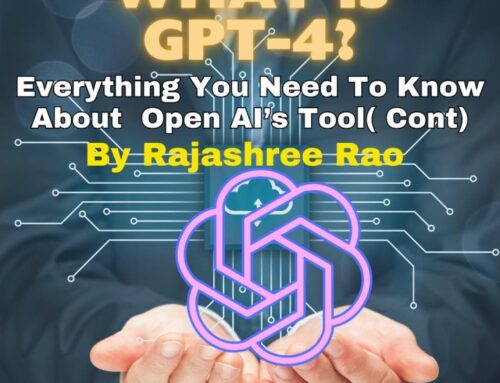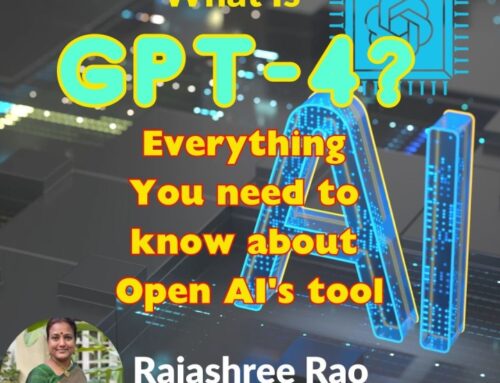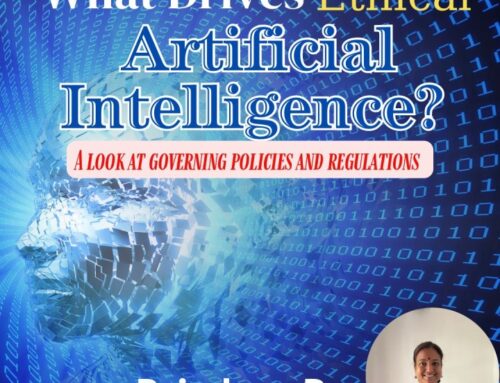Imagine a world if the industry could harness the multitude of data being generated to catalyse a positive change. What would it be like if the industry could predict and prevent crimes even before they have happened, or apply the AI methodologies to save lives with advanced healthcare? Doesn’t it sound like the plots from the Sci-fi movies? With the recent developments in the artificial intelligence (AI), these transformations are not only possible but in reality, a dream come true.
Our technology and tools evolved drastically in the 20th century, due to the advances in transportation, medical technology, space exploration, communications technology, and the birth of Digital Revolution. In the 21st century, the technologists built machines that have their own brain but also to outperform a human. Know that we are not dealing with dumb machines anymore which are programmed to perform specific tasks, but are dealing with AI which will learn from the human mistakes and identify patterns from extensive data, in a way that’s beyond human capabilities.
Artificial Intelligence (AI) though has been long discussed, but the real-time applications have seen a resurgence in the past few years across industries. The continuous hardware advancements and breakthrough in the Machine Learning (ML) algorithms have unleashed a new wave of exponential progress which is set to impact every industry verticals.
The First-mover have substantial advantages in AI, and access to data determines the strength of their offerings. However, there are research and business dynamics that make the commercialisation of algorithms challenging. Real success in AI depends entirely on the timely access to the data, drawing insights, and viability from the Big Data Analytics and Internet of Things (IoT) paradigms.
Although the field of AI was coined in the 20th century during a conference at Dartmouth in 1956 by a group of computer scientists, it exploded since 2015, because of the rise of cheaper, faster, and robust processing power, the flood of data, infinite storage capacity, and advances in Deep Learning which is a subset of Machine Learning, a subset of AI.
Even though all industries stand to benefit significantly from AI, the adoption happening is at different levels. This is primarily due to the focus on innovation, ecosystem involvement, and exciting trends in the technology adoption. The diverse applications of AI, large technology organisations and vertical industry leaders have taken a keen interest in the AI solution developments and adoptions.
Let us look at the advances of AI in the four major industry verticals:
1. Healthcare:
The trend we see in the Healthcare Industry is the entry of the digital technology companies like IBM, Google, Microsoft, and Apple. They aim to transform the healthcare industry with mining the medical records to provide faster and better healthcare services.
For instance, IBM Watson derives the context and meaning of the structured (like clinical notes) and unstructured data (relevant reports) which is critical for choosing the right treatment plan and combine various attributes from the patient’s medical record to identify the right kind of treatment plan for a particular patient. In short, it works similar to a human doctor. American co-founder and physician of Mayo Clinic, William J.Mayo has stated, “Medicine aims to prevent disease and prolong life, the ideal of medicine is to eliminate the need for a physician.”
Although the focus of AI is more to empower the physicians rather than replace them. Among the healthcare value chain AI ecosystem most of the developments are happening in the field of Prediction and Prevention, Aging, Wellness, Rehabilitation and Technological augmentation of doctors. AI is becoming the game-changer in healthcare, concerning patient diagnosing and treatments for chronic diseases like cancer and diabetes.
There are several challenging obstacles which the medical institution is facing while providing the optimum healthcare services. According to a research, currently, there is a shortage of approx, more than seven million health workers and physicians in the world and the gap is widening steadily. Doctoring resources are also stretching thin, especially in the underserved areas, in terms of responding to a high number of medical issues reported by the ever-growing human populace.
Meanwhile, the training of the health-workers and physicians is a long-drawn process which demands years of education, hands-on domain expertise and professional experience. Fortunately, Artificial Intelligence will be able to help healthcare industry to overcome these current and future challenges. Right from managing the medical records, to designing evidence-based treatment plans, and replacing human-beings in doing the repetitive tasks, AI has many implications where versatility is called for in the Healthcare Sector. Precision Medicine, Predictive Analytics, and Clinical decision support are some of the likely use-cases for AI technological developments that are already underway. Artificial Intelligence and Machine Learning have made a significant breakthrough in the medical imaging, medication management, drug discovery, and robotic surgery. Here is a video on Da Vinci Robot Stitching a Grape Back Together
2. Automobile:
The automobile industry continues to face a dynamic set of challenges and obstacles. Globalization, changing market conditions, cost pressure, growing competitions, and volatility is leading to a significant transformation in the landscape. The emergence of Autonomous vehicles and self-driving cars are increasing the customer expectations. The Auto Industry is on the brink of a significant revolution.
The quest for driverless cars started in the 1970s. However, it never turned into reality until the development of high Computing power, GPS, Cloud computing, and Artificial Intelligence. The fully autonomous vehicles are still not out for the operation yet in the market. Auto giants like BMW claim that their futuristic autonomous “i-Net car” will hit the market in the next four year time. Toyota has also unravelled a self-driving concept car powered by an AI in-car assistant called ‘Yui.’ Yui will not only learn your driving patterns, and the roads frequently travelled so far, but also will tell your emotional experience during the drive. Yui will act as your virtual companion, copilot, a travel guide and also as a spa attendant all the while getting to know you better over time. Here is a glimpse of the car.
Artificial Intelligence and Machine Learning algorithms have finally found a new level of sophisticated applications in the Automobile Industry. AI is also used for learning the human behaviours and understand how to respond to different driving conditions. This includes sensing how other cars function, road obstacles, weather conditions, and several other factors are considered before the Autonomous vehicles take to roads. This will ultimately revolutionise several industry verticals right from the public transportations to taxis, to delivery firms, and ridesharing applications like Grab or Uber.
3. Manufacturing:
Manufacturing Industry will see the most significant impact of Artificial Intelligence coupled with Automation. AI plays a vital role in improving the enterprise software. Right from Predictive Analytics to Maintenance and Optimization of Industrial Machines and facilities, Improving material management, Interpreting the data flow across departments, and the list goes on. Factories today are equipped with cutting-edge technology sensors that help in detecting defects in the manufactured products. This data is fed onto the cloud which pulls the defective parts immediately from the production line and order for the replacements. Consequently, the real-time problem solving saves manufacturers billions of dollars in repairs and lost business.
Robots have a significant presence in the Manufacturing Automation, and it continues to grow further. A China-based mobile manufacturer Changying Precision Technology. The factory underwent an AI Automation and is now run by only 60 workers and 60 robots that work round the clock leading to 250% increase in the productivity and 80% drop in the defects. This clearly outlines a case for AI Automation.
Google acquired eight robotics companies in 2013 within six months time, and that is said to be the heart of Google’s moonshot program. Google is not developing its software but also the hardware to ensure the final product compatible and robust giving a hint to build much more advanced robots in the coming decade. However, amongst all Japan is the undisputed world leader in robotic technology. However, Japan’s supremacy in the field is being challenged by the upcoming rival robot producing countries. Japan to build thirty million Peppers (World’s first emo robot represents a massive leap in the AI as it can read facial expressions, voice tones and body language and then respond) to create a workforce that can make Japan the world’s number one manufacturer again.
4. Retail:
Retail is one of the fastest growing industry in the world, and the retail E-commerce is growing even faster. Competition is fierce, and this leads to innovation within the industry. I am sure you have already experienced AI in e-commerce, but might not have noticed. Whenever Amazon recommends a product to you, know that AI drives it. A very complex set of algorithms are used to determine what you are likely to buy based on your purchasing history, demographic profile, and other products you have already viewed. Amazon generates large quantities of data, and AI uses this data to make highly customised customer centric targeted recommendations.
When you use a live chat tool, either on a social media platform like Facebook or on a website, to communicate with a brand, there is a possibility that, you might have been speaking to an AI-powered chatbot that is feeding you a preset range of responses based on your queries and comments. Customer service is the perfect place for automation using AI. Most of the customer service queries follow similar patterns, such as, “Where is my order?” or Can I change my delivery option?” Customer service agents will usually have a script to follow based on your queries, and the majority of the questions will fit within the small set of scenarios. For, e.g., If a customer calls to ask when his/her order will be delivered, the customer service agent will ask for the authentication of the customer, maybe with the postcode and an order number, then search for the order within the internal systems to find the order status and delivery date.
This process is easily automated as it doesn’t take any initiative from the agent, who is following a scripted and standard procedure. By automating processes like these redundant and repetitive tasks, humans can be freed to deal with more complex queries which the AI might not be programmed to handle as yet.
To summarize, Artificial Intelligence (AI) and Machine Learning (ML) and Deep Learning (DL) will continue to evolve as the industry and organisation understand the incredible power offered by the solutions driven by these transformational technologies. However, the transformative results through AI will not come without effort. To unlock the full potentials of the AI, ML, and DL organisations will have to do the heavy lifting of going on, ‘all in’ digital transformation, embracing data sovereignty, and accelerating their computing methodologies. AI will be the dominant technology witnessing the adoption of viable real-time applications with ample commercial use-cases with ROI generating apps rather than just experiments.




